International Women's Day around Europe and Central Asia
On and around International Women’s Day, 8 March, a rich diversity of initiatives celebrate women’s achievements, activism and potential in Europe and Central Asia. UN Women, along with partners, organized events across the region, under the theme of “Time is Now: Rural and urban activists transforming women’s lives”. From important social and digital campaigns, panels, seminars and press conferences to engaging the international community and members states with discussions around gender equality at key international meetings, here are some highlights from the occasion in our region.Date:
Geneva
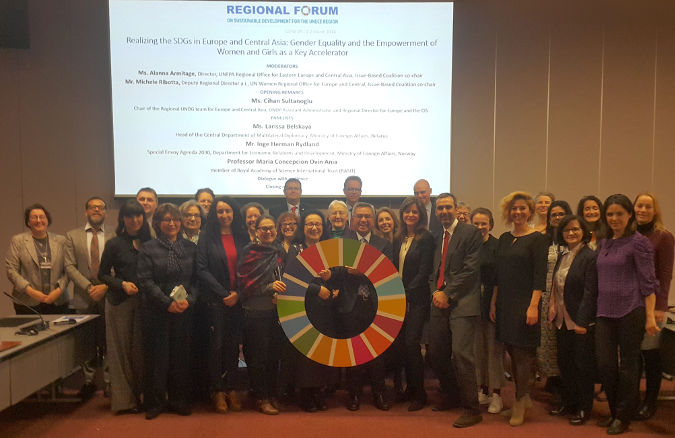
A panel discussion on gender equality as an accelerator for the implementation of the Sustainable Development Goals brought together more than 30 people, including member states, civil society and representatives from UN agencies and international organizations, at the Regional Forum on Sustainable Development for the UNECE Region in Geneva. Organized by the United Nations Issue-Based Coalition on Gender Equality for the Europe and Central Asia region, which consists of 13 UN agencies and entities, co-chaired by UN Women and UNFPA, the event highlighted key regional trends and success stories related to tackling gender inequalities and developing strategies for overcoming these barriers and bottlenecks to sustainable development. “At the side event, governments, civil society and the UN system shared experiences and good practices, while at the same time confirming the need to focus on overcoming persisting legal and policy obstacles that prevent gender equality and the full empowerment of women,” said Michele Ribotta, acting Deputy Regional Director for UN Women Regional Office for Europe and Central Asia.
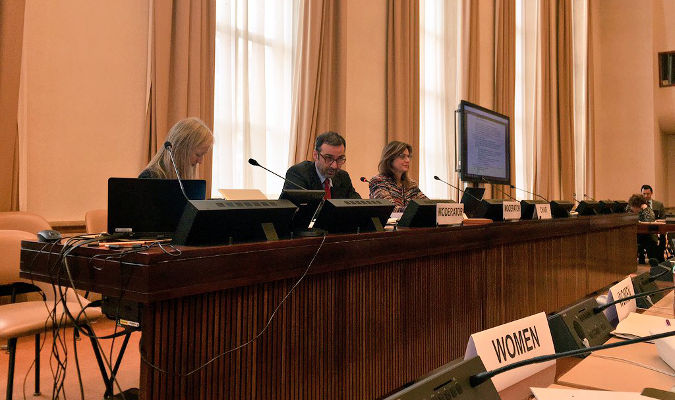
Michele Ribotta, acting Deputy Regional Director for UN Women Regional Office for Europe and Central Asia, presented the flagship UN Women Report “Turning promises into action: Gender equality in the 2030 Agenda for Sustainable Development” at the Civil Society Pre-Meeting on 28 February, ahead of the Regional Forum on Sustainable Development for the UNECE Region in Geneva. Speaking to a full room of civil society representatives from across the region, Mr. Ribotta presented new findings from the report and pointed to the persisting inequalities among different groups of women and girls which prevent them from realizing their full potential and hinder progress with the achievement of Agenda 2030. “The report recommends production of more and better gender statistics, greater efforts to close the financing gap and increased accountability of those in power,” said Mr. Ribotta.
Albania
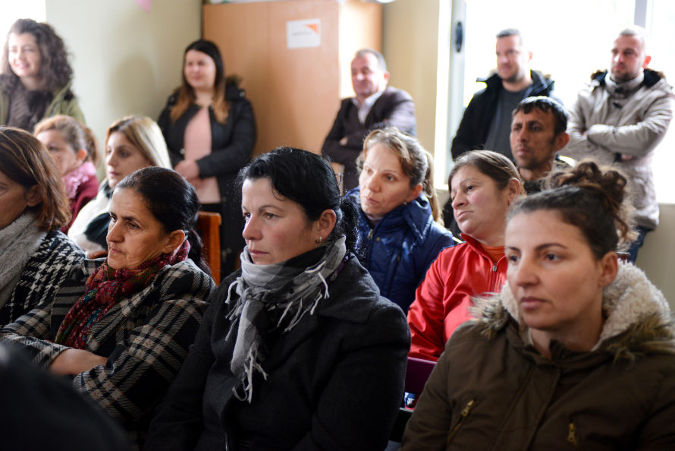
Women and men of Shushice village in Elbasan, a large city in central Albania, held a discussion about social norms and attitudes that promote gender equality and prevent violence against women with religious leaders on 2 March.
“Strong stereotypes exist, especially regarding mothers as heads of household. It is necessary to empower mothers,” said Etleva Mezini one of the participants from Shushice village.
The discussion took part under the umbrella of the regional programme “Implementing Norms, Changing Minds” which works to end violence against women in the Western Balkans and Turkey, financed by the European Commission.
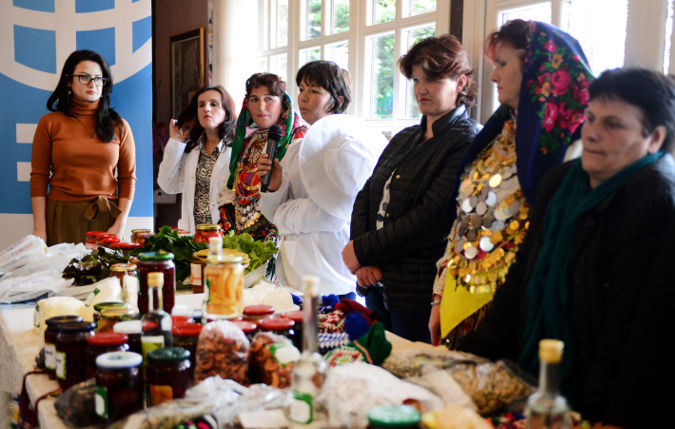
“You are the backbone of agriculture in Albania,” said UN Women Albania Representative Giuseppe Belsito addressing women of Gjinar village at an event organized as part of the “Women’s Week” in Elbasan on 5 March with the participation of the President of Albania, Ilir Meta. Women farmers shared their stories and daily challenges and also presented their local products. 54 per cent of women, active in the workforce in Albania, work in agriculture and still their work is not recognized. They lack opportunities for developing their skills and applying for grants. "Besides poverty and the low level of education in rural areas, the high level of informal and unpaid work for girls and women in these areas is a great concern. They need full access to education and training and also be part of grant schemes," highlighted Ilir Meta, the President of Albania. "You are a great contribution to the economy of the country. Your work can be an example for other women working in rural areas," added Belsito. In Elbasan, UN Women has been active in two rural areas, Gjinar and Belsh, assisted the establishment of clusters promoting self-employment and financial opportunities with support from the Embassy of Sweden in Tirana. Two clusters for the economic empowerment of women officially came to life in 2016, providing opportunities to 45 women.
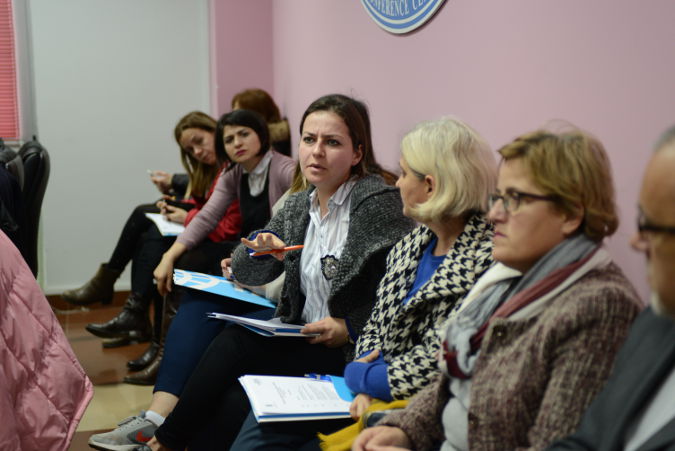
On 6 March, UN Women conducted a rapid gender needs assessment in Elbasan, where participants from civil society, academia, media and local authorities highlighted key priorities for the achievement of gender equality in the region. Raising awareness among the community and changing their mindsets about gender discrimination and gender-based violence was one of the key interventions that the participants identified. Other issues that the participants raised were; the need to conduct skills analysis to identify the potential of jobseekers and the market needs, lack of daycare and markets in rural areas, lack of access in vocational training and services for rural women, limited access on incentives for rural women, and challenges in creating sustainable businesses.
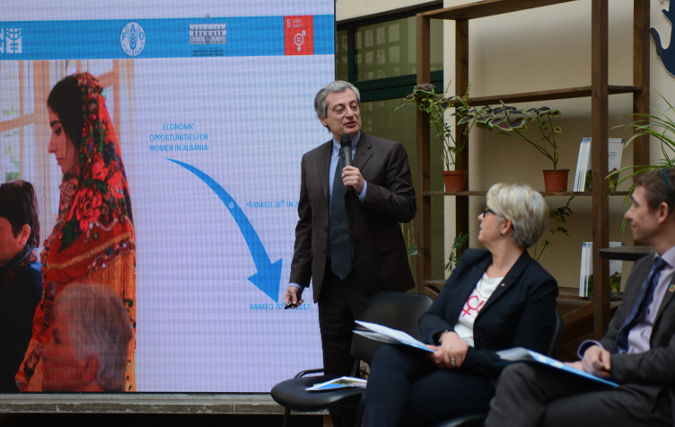
On the occasion of International Women’s Day, the Ministry of Agriculture and Rural Development in Albania organized the roundtable "Challenges and Opportunities to Achieve Gender Equality and the Empowerment of Women and Rural Girls" with the support of UN Women on 8 March. "We need to create models that bring sustainable economic development. Through the Government’s 100 villages project and the joint initiative we have with UN Women and FAO, rural women will be the main beneficiaries and we’ll be able to achieve a healthier domestic economy," said Niko Peleshi, the Minister of Agriculture and Rural Development, stressing that time is now for concrete actions to empower women in rural areas. To address the challenges and inequalities facing women in rural areas, the Ministry of Agriculture and Rural Development, UN Women and FAO have developed a special initiative for “Gender Equality in Rural Development and Tourism”, named GREAT (Gender Rural Equality and Tourism). This initiative aims to contribute to the empowerment of women in rural areas and to strengthen their role in rural development as one of the targets of the 2030 Agenda. “This event brings us together to discuss two important areas – agricultural development and women’s empowerment – both areas with challenges and tremendous opportunities at the same time. The UN supports women’s empowerment. Women are powerful agents of change and empowering women benefits the whole society,” highlighted Brian Williams, UN Resident Coordinator in Albania. Improving the life of rural women is one of the key recommendations of the National Strategy for Gender Equality in Albania for 2016-2020. The GREAT initiative is the gender-focused response as part of the project of 100 villages and emphasizes the following: The creation of a favourable business environment for women through the creation of incubators and the provision of local government services; the creation of a product chain linking women farmers to the market and consumers, and the creation of local development groups (LAGs) in accordance with EU criteria. “We need to move from a gender mainstreaming approach to a gender-focused approach. Women living in rural areas are one of the most vulnerable groups in Albania. Through the GREAT initiative we intend to strengthen them by providing services through municipalities or help them get organized into active groups," said Giuseppe Belsito, UN Women Representative in Albania.
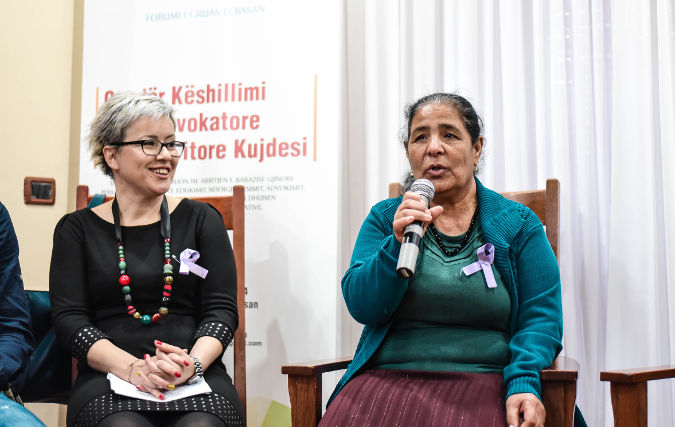
On the same day, an awareness raising event was organized in Elbasan, as part of the EU funded regional programme “Implementing Norms, Changing Minds”. Activists that are agents of change in contributing to changing the mindset of the community, especially in rural areas, were at the center of the event. These activists that come from different areas and backgrounds, such as students, teachers, health care providers and representatives from the Roma and Egyptian communities, shared their experiences and personal stories. Representatives from the local government, the police, the health sector, social services and civil society organizations were present at the event. “Education and integration of Roma girls is necessary to prevent early marriages. Time is now for Roma women to speak up for issues they are concerned about,” said Nexhmije Ademi, a Roma woman. “Informing and supporting cases of violence put me at risk many times, but I still continue to inform and help women that face violence,” said Rukije Samurri, a nurse. “The time of our grandmothers when women were considered property of men, is over. Today women have to make their own decisions and be independent,” said Maksim Malaj, Head of the Region of Elbasan.
Bosnia and Herzegovina
In Bosnia and Herzegovina, to commemorate International Women’s Day, the United Nations system took action to recognize and honor women who support, promote and work towards achieving gender equality in the country. In order to ensure that the voices of women activists are heard, UN Women issued a call for nominations, in coordination with other UN agencies, for activists to share messages related to gender equality, women’s empowerment and the Sustainable Development Goals. The aim of the initiative is to capture their efforts in transforming women’s lives and share their stories as widely as possible, illustrating the role of women in achieving the Agenda 2030 and the Sustainable Development Goals. The chosen candidates delivered important messages related to ending violence against women; rural women and activism; women in politics; women and health; women in sport; women in STEM; urban activism – safe cities for all; women, peace and security; women and environment; female entrepreneurship and economic empowerment; female workers’ rights; women with disabilities and Roma women’s rights. United Nations in Bosnia and Herzegovina now presents these 10 women whose work show why we need gender equality. Watch their videos here.
Georgia
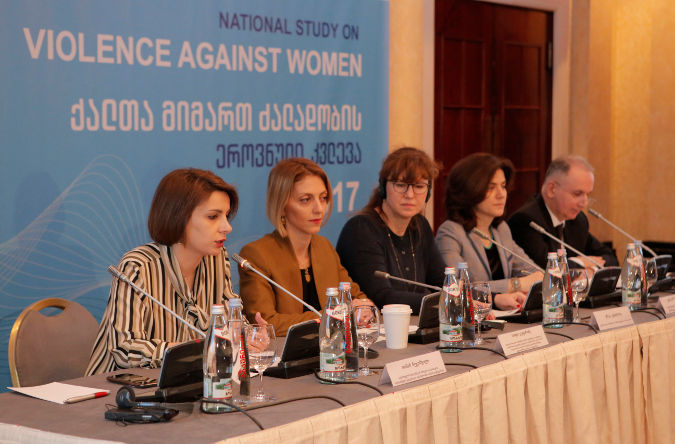
As part of International Women’s Day commemorations, UN Women, EU and National Statistics Office of Georgia (GEOSTAT) released the key findings of the new National Study on Violence against Women in Georgia together with partners from the government, development sector and civil society in Tbilisi on 6 March. According to the study, one in seven women reported having experienced domestic violence and one in five women reported having experienced sexual harassment in their lifetime in Georgia. For the first time in Georgia, the study also generated data on the prevalence of sexual harassment and stalking at the national level.
“The study findings fill the gap in the nationally representative data on the prevalence of violence against women in Georgia and provide baseline for the nationalized Sustainable Development Goals indicators. The data analysis will further inform policymaking as well as awareness raising interventions aimed at prevention and effective response to violence against women and girls in Georgia,” said Erika Kvapilova, UN Women Country Representative in Georgia. Read more.
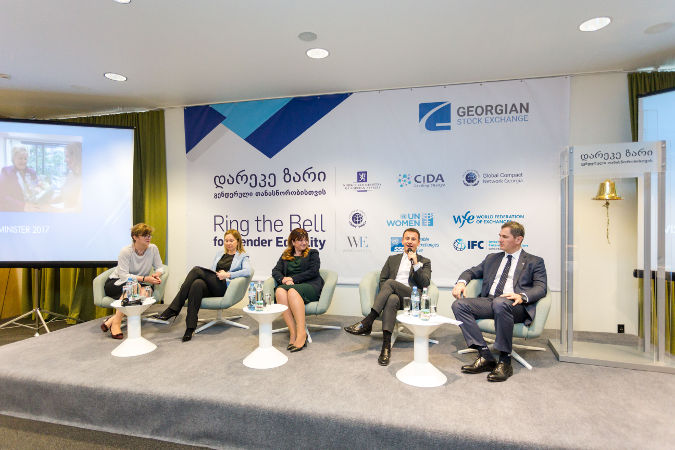
The Georgian Stock Exchange, International Finance Corporation, UN Women, Global Compact Network Georgia, and NGO Civil Development Agency commemorated International Women's Day at the "Ring the Bell for Gender Equality" event in Tbilisi, Georgia. The event provided space for discussions about the role of the private sector in Georgia in empowering women at work, in the corporate value chain and in the community, highlighting the “business case” for gender equality. The representatives of the Government, regulatory bodies, the private sector, NGOs and UN agreed that public-private partnerships are essential for successfully addressing challenges, including persistent gender stereotypes, and scaling up women’s economic opportunities and empowerment. Read more.
Kazakhstan
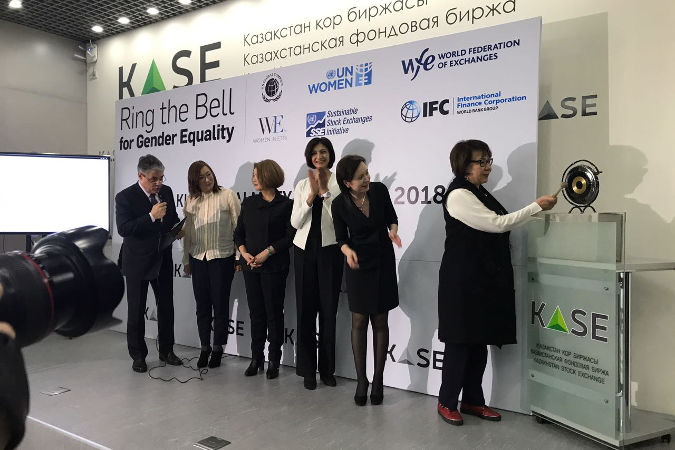
To commemorate International Women’s Day, UN Women, Kazakhstan Stock Exchange (KASE) and IFC organized a “Ring the Bell for Gender Equality” event in Almaty, Kazakhstan. High-level representatives of the major financial institutions of Kazakhstan, including National Bank of Kazakhstan, "Damu" Entrepreneurship Development Fund, National Chamber of Entrepreneurs "Atameken", and Association of Business Women of Kazakhstan attended the event. UN Women Kazakhstan Representative Elaine Conkievich addressed the event through a video message. "Unleashing the full potential of women and girls by empowering them to be equal members of society has a multiplier effect on families, businesses, communities, and nations and is essential to achieving sustainable development. Research shows that empowering women is not only the right thing to do, but also the smart thing to do. It can lead to increases in GDP, higher productivity and return on investment, and better organizational effectiveness," said Conkievich. For the fourth year, a global collaboration across 61 stock exchanges around the world organized “Ring the Bell for Gender Equality,” to celebrate International Women’s Day. The events are a partnership between IFC, Sustainable Stock Exchanges (SSE) Initiative, UN Global Compact, UN Women, the World Federation of Exchanges and Women in ETFs, to raise awareness about the business case for women’s economic empowerment and the opportunities for the private sector to advance gender equality and sustainable development.
Kosovo[1]
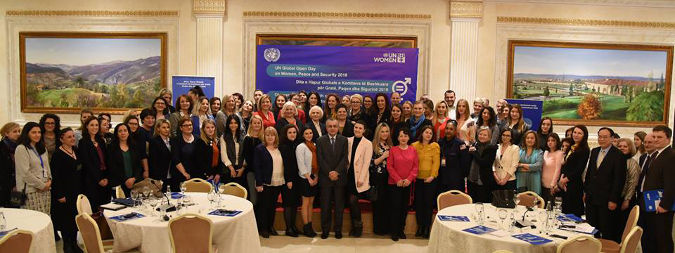
As part of the commemorations for International Women’s Day, UN Women and United Nations Mission in Kosovo (UNMIK) organized the UN Global Open Day on Women Peace and Security on 5th of March, in Pristina. The 6th Global Open Day event, designed to support regular dialogue between UN senior leadership and women’s organizations, brought together women political leaders from the central and local level, representatives of civil society, women’s groups and emerging young women leaders as well as representatives from international organizations, think tanks, academia and embassies to discuss women’s political participation in Kosovo.
This year’s event provided an important opportunity to highlight the experience of women candidates from the 2017 elections, focusing on the achievements and obstacles they faced. The event was an opportunity for participants to identify key challenges that inhibit women’s participation in politics, such as resources; sustainable support from the political parties; discrimination and stereotyping for candidates as well as the lack of capacity-building support for elected women. “It is important to go beyond symbolism and numbers, to make sure the voices of women are equally heard in order to achieve gender equality,” said Zahir Tanin, Special Representative of the Secretary-General and Head of the United Nations Mission in Kosovo. Xhavit Haliti, Deputy President of the Assembly of Kosovo, emphasized the importance of equal engagement of men and women at all levels in the society. Flora Macula, UN Women Kosovo Head of Office, highlighted the importance of women’s access to decision making power to be able to represent half of the country’s population and to prevent women’s rights to be compromised in areas other than political representation. Read more.
Kyrgyzstan
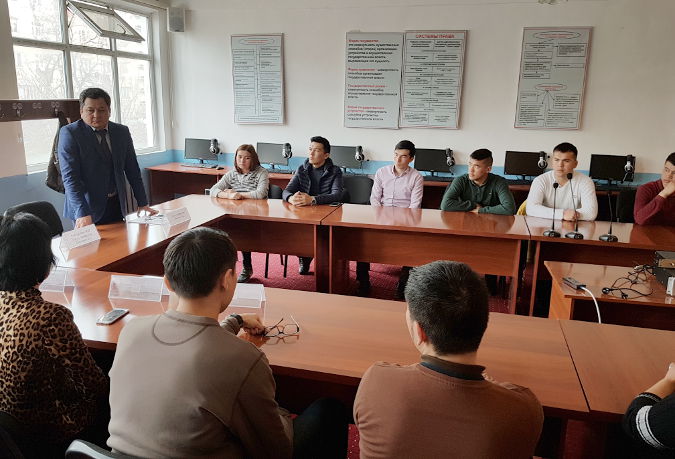
On the eve of International Women’s Day, UN Women held a round table on "Early marriage: The risks and consequences”, together with Osh State Law Institute. Recently, an increase in the number of early marriages in southern Kyrgyzstan started to raise concern among the public. Gender experts are concerned about the cases of early marriages and early pregnancy among young girls. UN Women actively conducts public awareness activities to prevent early marriages in Kyrgyzstan, as well as organizing training seminars, both in rural areas and in cities, for the youth that are part of UN Women Programming. At the moment, a significant number of young people in the pilot regions already have information about the marriage law, the minimum age for marriage, the responsibility for conducting marriage religious rites with minors, and what negative consequences early marriage and childbirth can bring.
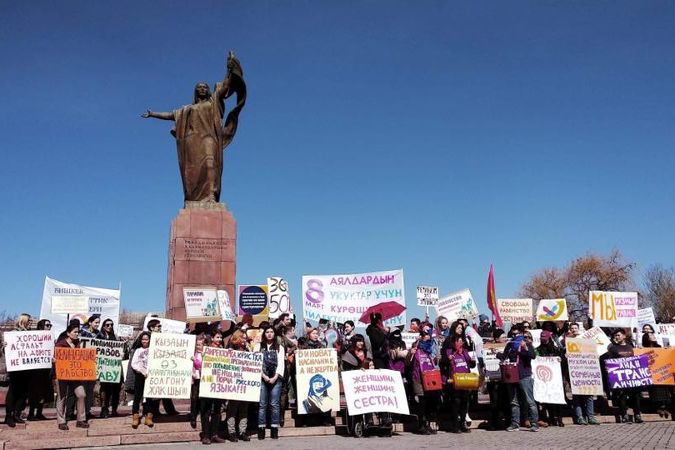
On International Women’s Day, Young Bishkek Feminist activists organized annual Women's Peaceful March at the city centre in Bishkek, Kyrgyzstan’s capital. Activists called on everyone to unite in the struggle for a life without violence and discrimination against all women and girls, against homophobia and transphobia, misogyny (misogyny), and ablism (discrimination against people with disabilities).
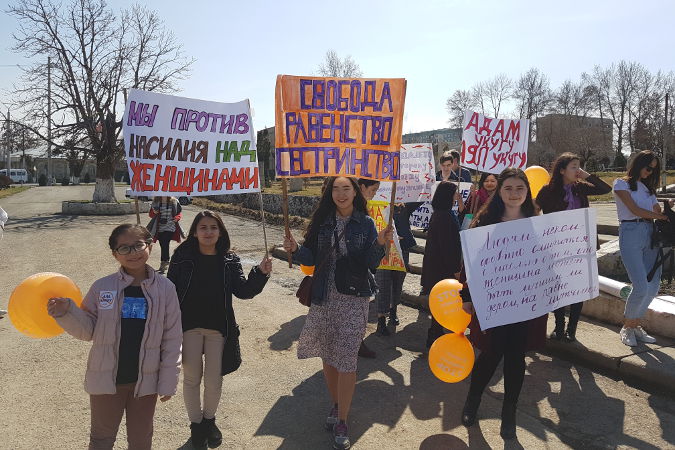
On the same day, UN Women marked International Women’s Day in conservative, male dominated city of Osh, in southern Kyrgyzstan, together with peer educators and local young activists. Civil society activists marched along the main streets of the city and ended up with conducting self- defense courses for girls and organized a comic performance to tackle the discriminatory practices of early marriages, bride-kidnapping, and domestic violence.
The former Yugoslav Republic of Macedonia
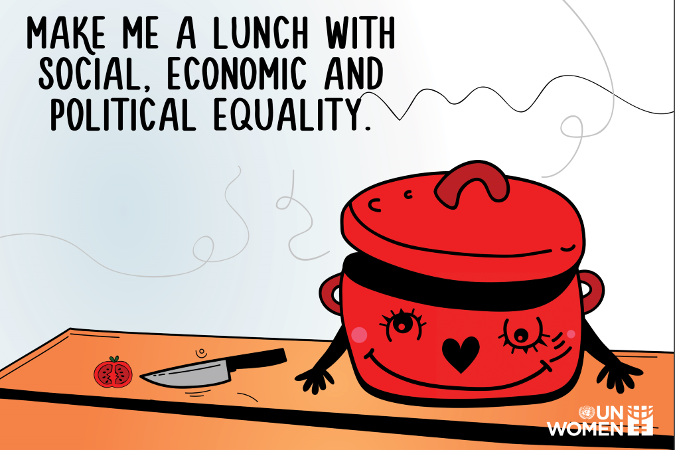
On 7 March, UN Women launched a social media campaign in the former Yugoslav Republic of Macedonia under the slogan “Give a card, not a carnation”. The goal of the campaign was to raise awareness about the real meaning of International Women’s Day and speak up about persisting gender inequalities. The social media campaign consisted of 11 greeting cards that can be shared among people to commemorate International Women’s Day. The cards included messages of overcoming gender roles and stereotypes that are engrained in the society, promoting equal distribution of domestic chores between women and men, boys and girls as well as spotlighting women’s activism in line with this year’s theme. Most popular Macedonian portals joined and supported the campaign by placing an electronic banner on their websites that led directly to the cards published on UN Women Skopje Facebook page. The campaign drew wide-spread support and interest. In only a day and a half, the cards were widely shared and liked on Facebook and Instagram. UN Women Skopje office will continue the social media campaign by profiling women’s rights activists in the county during March.
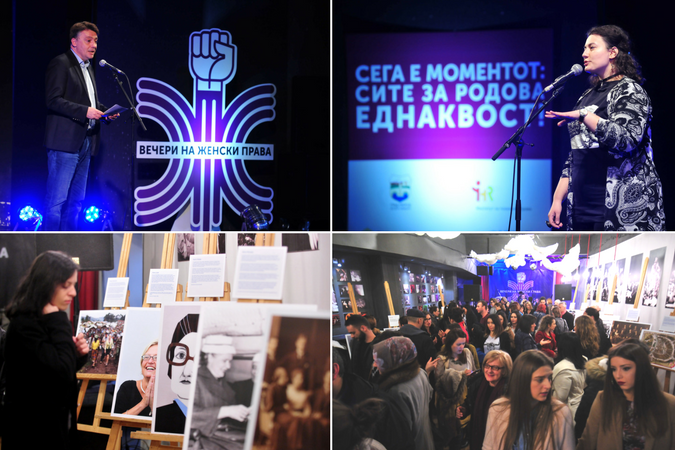
Over 350 people participated at the 9th edition of the Women’s Rights Nights on 8 March in Skopje, celebrating the theme “Time is now for gender equality”. In his opening remarks, Petre Shilegov, the Mayor of Skopje, spoke about the fight for gender equality and noted that “it is an everyday fight, a fight that each one of us need to undertake”. Dominika Stojanoska, Head of UN Women Skopje Office reflected upon the real values of International Women’s Day and said, “We have to recognize and support all activists that fight to put an end to discrimination, exclusion and injustice.” She also noted that “now is the time for equal rights and equality for girls and women and now is the time to leave no one behind.” The event hosted an exhibition consisting of two ensembles – the Swedish exhibition “Pioneering a Foreign Feminist Policy,” presenting key women and milestones in the Swedish foreign feminist policy, and the Macedonian ‘equivalent’ presenting the (in)visible women in the Macedonian history. The Spanish documentary movie “Borders and Promises” (2017) directed by Roisin McAuley was screened, followed by a debate by high-profile gender equality advocates. Women’s Rights Nights was organized by UN Women Skopje Office, the City of Skopje and the Institute for Human Rights, in collaboration with the Embassy of Sweden in Skopje.
Moldova
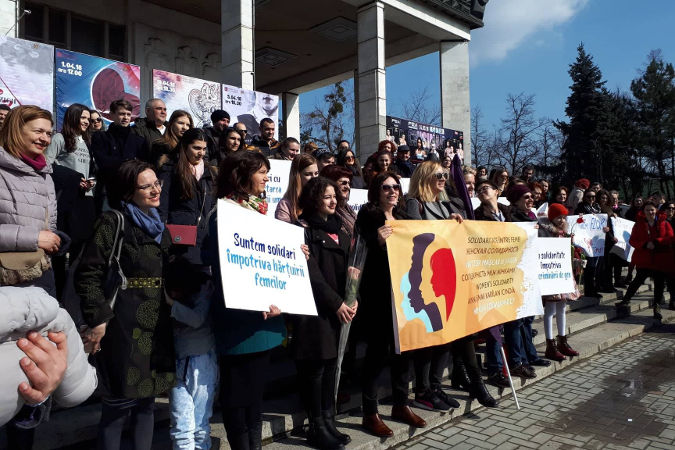
To commemorate International Women’s Day, Moldovan women and men joined the Women Solidarity March, organized by civil society organization on 8 March in Chisinau, the capital city of Moldova, to make an urgent call for the advancement of gender equality and support for women's empowerment. Posters and banners called for solidarity with women with disabilities, survivors of gender-based violence and women in politics. Participants of the march also called for elimination of discrimination and violence against women. Signe Burgstaller, the Swedish Ambassador to Moldova and Asya Varbanova, UN Women acting Head of Office in Moldova were among the participants of the march. Participants also called for men to step up for gender equality.
Serbia
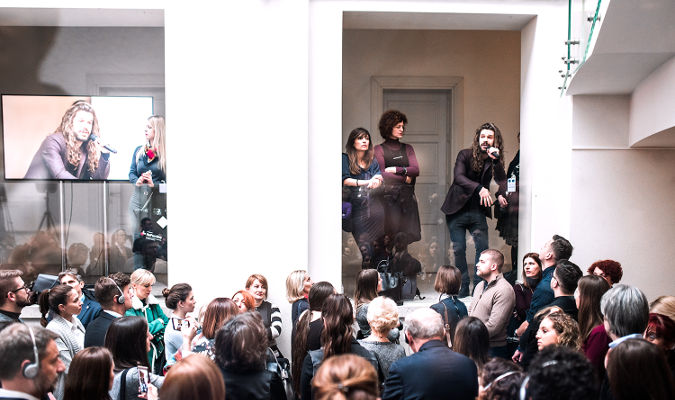
On 8 March, Serbia marked International Women's Day by launching a three-year EU programme named ”Support to Priority Actions for Gender Equality in Serbia”, together with the EU Delegation to Serbia, Coordination Body for Gender Equality and Ministry of EU Integration. Key note speakers included Sem Fabrizi, Head of EU Delegation to Serbia; Jadranka Joksimovic, EU Minister; Zorana Mihajlovic, Deputy Prime Minister and Sabine Freizer, UN Women Policy Advisor on Governance, Peace and Security. All speakers agreed that Serbia has achieved a lot in the field of gender equality in the past couple of years but still a lot more needs to be done to advance gender equality and women’s empowerment. The main goal of the EU Programme is the full implementation of gender equality commitments of Serbia as part of the country’s EU accession process.
The event, held in the Yugoslav Film Archive, gathered more than 150 people including US, German, Norwegian, Portuguese and other ambassadors, ministers as well as gender experts and women’s rights activists.
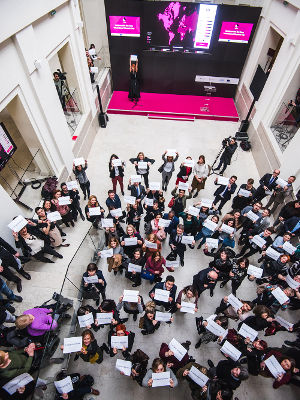
At the event, Serbia also joined the world's largest solidarity movement for gender equality, the HeForShe Campaign. actor Milan Maric, taekwondo world champion Milica Mandic, actor Luka Raco, graffiti artist Aleksandra Djordjevic, musician Vukasin Markovic, the only roma opera singer Natasa Tasic Knezevic, ambassador of Finland to Serbia, Pertti Ikonen, and poet Ana Marija Grbic spoke about how they are promoting gender equality in their respective fields, as agents of change in the society.
The campaign will last for two weeks and will include a social media challenge and billboards and street art calling for a gender equal world.
Turkey
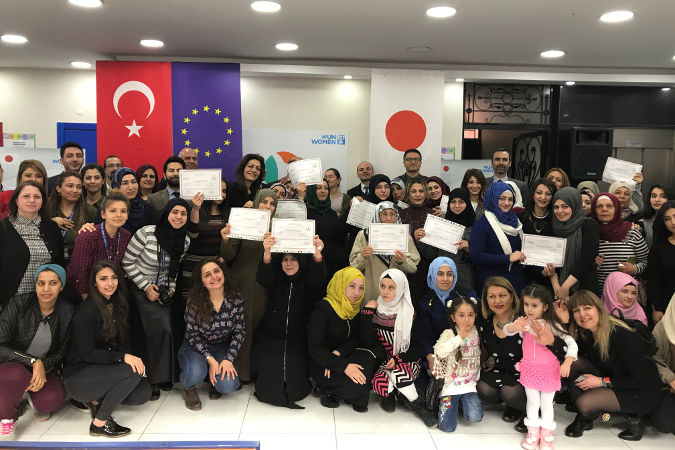
The first graduates of the SADA Women-only Centre, which provides vocational and language skills to refugee and local women in Gaziantep, southern Turkey, received certificates for completing their courses successfully on 7 March. The Centre has opened its doors in September 2017 and since then 1147 women, mostly Syrian refugees, have registered to the vocational trainings and Turkish language courses. More than 700 women deserved to take official certificates on hairdressing, make-up, computer operating and packaging. SADA Women-only Centre activities are implemented under the leadership of UN Women, with financial support of Japanese Government and EU Regional Trust Fund in Response to the Syrian Crises in close collaboration with the International Labour Organization (ILO), Gaziantep Municipality and the Association of Solidarity with Asylum Seekers and Immigrants (SGDD-ASAM). “I am 75 years old and from Syria. I am so proud and happy to learn the Turkish language at this age in this Centre,” said a Syrian refugee woman. “SADA Women-only Centre is an important example of fruitful cooperation among different institutions with different specializations. The Centre will be a model to duplicate in the country as a great example of a safe space just for women, providing them with livelihood facilities,” said Michele Ribotta, UN Women Deputy Regional Director a.i. for Europe and Central Asia. Read more.
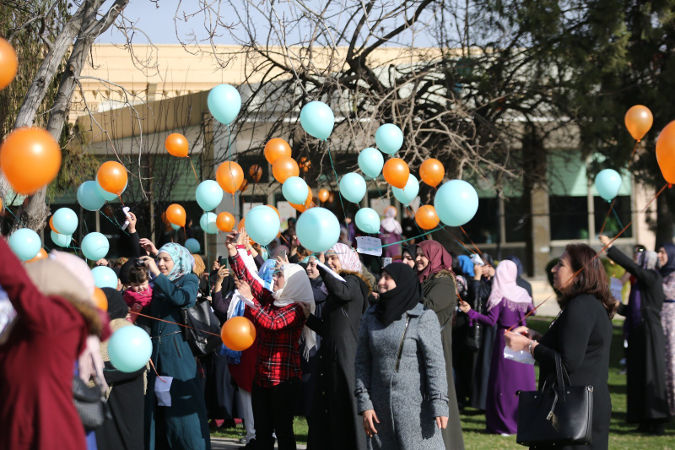
Photo: UN Women
Following the certificate ceremony, on International Women’s Day, more than 300 refugee and local women from the SADA Women-only Centre gathered in a women-only festival to commemorate the day and celebrate women’s solidarity with a variety of events. They presented their handicrafts and other products, which they’ve learned to produce at the vocational courses of SADA Center, sang songs, performed theatre plays, read poems and short stories. Women and children released orange and blue balloons in the air to say Time Is Now for freedom and peace.
Ukraine
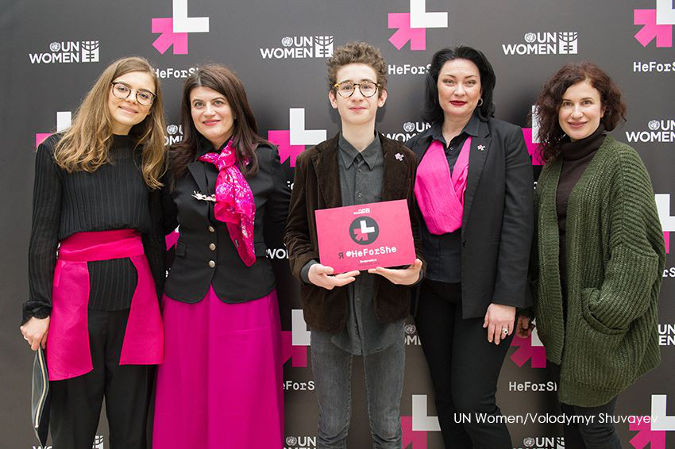
More than 200 Ukrainian artists, activists, government representatives, ambassadors, and representatives of international organizations made commitments to achieve gender equality at the launch of the HeForShe campaign on 7 March in Kiev, Ukraine’s capital. The campaign was presented by HeForShe advocate and musician Lev Shurov, Head of UN Women in Ukraine Anastasia Divinskaya, Deputy Minister of Foreign Affairs of Ukraine Sergíy Kyslytsya, and Art-manager Kateryna Taylor. The artist Daria Koltsova created a participatory artistic performance showcasing the idea of freedom to be one’s self. Musical performance of the OY Sound System band presented female and male artists.
"I often feel pressure from school, parents, even friends. It seems to me that we are being imposed a certain style of behavior. Girls are obliged to be cute and nice. Boys are brave and ambitious. But these are gender stereotypes. It's absurd to say "Be a man!" or "Don't be a girl!". Boys and girls are born equal but different. In my life, I want to develop a lot of projects where men and women can be equally successful,” said 14-year old Lev Shurov, musician and HeForShe advocate.
"I think that art plays an important role in the evolution of society. And the fact that artists who in their work raise the questions of equality, tolerance and solidarity, plant the seeds of awareness to each spectator. That's why I am very honored to curate the HeForShe Arts Week in Ukraine. And I want to invite all of you to spend this week with us and join the HeForShe movement today,” said Katerina Taylor, art curator of the HeForShe Arts Week in Ukraine. For more photos click here.
Famous singer, jury member of the Ukrainian X-Factor and opinion leader Dmytro Shurov and his 14-year-old son Lev Shurov started the HeForShe movement as role-models and HeForShe advocates. A series of videos capture informal dialogues between father and son about women in politics and art, women champions in sports, shared family duties and domestic work, which all undermine persisting gender stereotypes in Ukrainian society. The videos aim to initiate discussion among Ukrainian youth. The scripts for these videos are created by a famous writer, journalist and human rights activists Larysa Denysenko, who also joined the movement as a HeForShe advocate and influencer in creative arts industry.
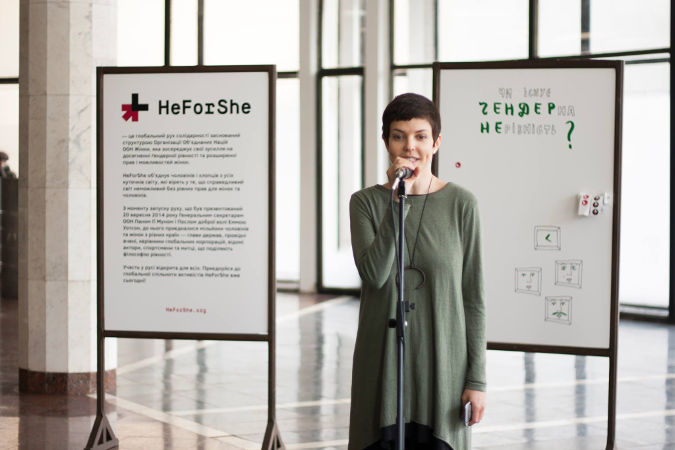
Together with a range of partners, UN Women organized the HeForShe Arts Week from 8 March to 15 March in Kiev, joining other cities across the world such as London, Madrid, Amsterdam, Stockholm, and Mexico. Ukraine joins the movement with the call "Free to be you". During the week, viewers are expected to attend lectures, exhibitions and other activities that encourage all those wishing to join the global solidarity movement for gender equality.
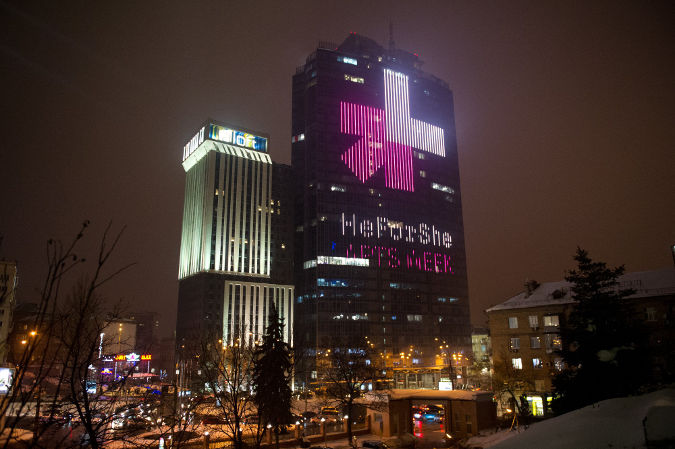
On 8 March, one of the biggest Trade and Business Centers of the capital Kiev, The Gulliver, the Pedestrian Bridge and The National Art Museum of Ukraine shined in magenta, the official colour of the HeForShe! For photos click here.
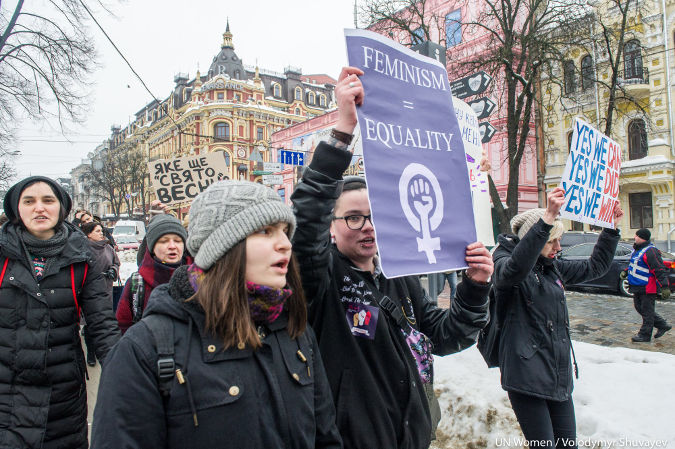
On the same day, UN Women joined the Women's March in Kiev to support activists working to advance gender equality in Ukraine.
WikiGap
Wikipedia is the world’s largest user-generated encyclopedia and is dominated by men, both as editors and in content. On International Women’s Day, more than 50 countries around the world have organized Wikipedia edit-a-thons, under the hashtag #WikiGap, in partnership with Swedish embassies to change that.
UN Women offices throughout the region have successfully collaborated with Swedish embassies to put on powerful #WikiGap edit-a-thons that have challenged the male-dominated space of Wikipedia and amplified women's voices and narratives.
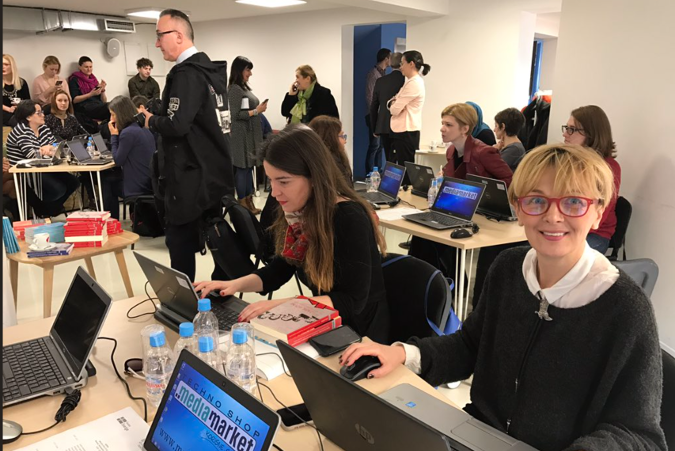
Photo: Embassy of Sweden in Bosnia and Herzegovina
UN Women supported the initiative in Bosnia and Herzegovina and joined the group of gender equality advocates at the edit-a-thon. UN Women has also been amplifying the #WikiGap initiative of the Swedish embassy extensively through social media. Complementing the #WikiGap initiative, UN Women mounted an advocacy campaign on Feminist Activists in Bosnia and Herzegovina, posting a featured video message from a local feminist activist on social media channels every day.
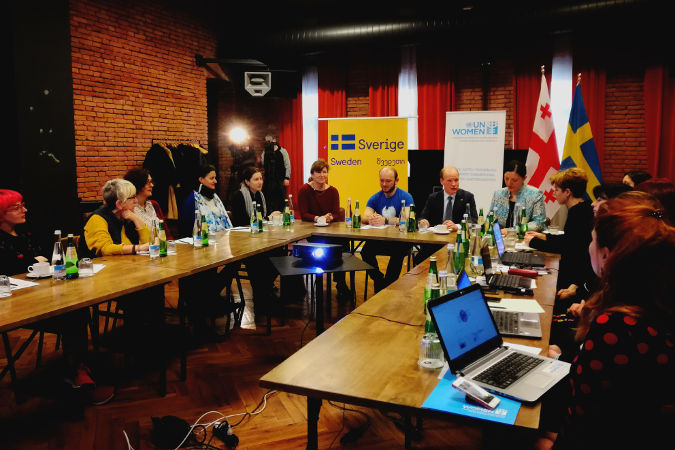
UN Women gathered 8 women journalists, bloggers and academics to participate in the WikiGap edit-a-thon in Georgia. The process was supported by Wikipedia representatives who started the event with a brief tutorial on submitting articles to the Wikipedia core. With the support of UN Women and the Embassy of Sweden, by the end of the event 8 articles on prominent Georgian women were submitted to Wikipedia. Read more.
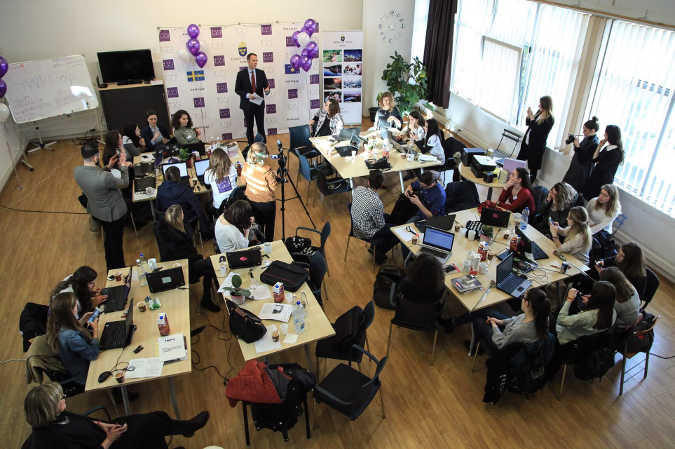
In preparation for the #WikiGap edit-a-thon, UN Women Kosovo in partnership with the Embassy of Sweden, provided sources on prominent women from Kosovo to be used by #WikiGap editors during the event. On the morning of 8 March, UN Women Kosovo and Embassy of Sweden representatives began their day by promoting the #WikiGap campaign on Kosovo Public TV station RTK before heading to the edit-a-thon. You can watch the interview here. To keep the momentum of International Women's Day going beyond 8 March, UN Women in Kosovo will also be posting profiles of prominent women from Kosovo on their Facebook page for 10 days. For more photos click here.
Snapshots of International Women's Day events around Europe and Central Asia
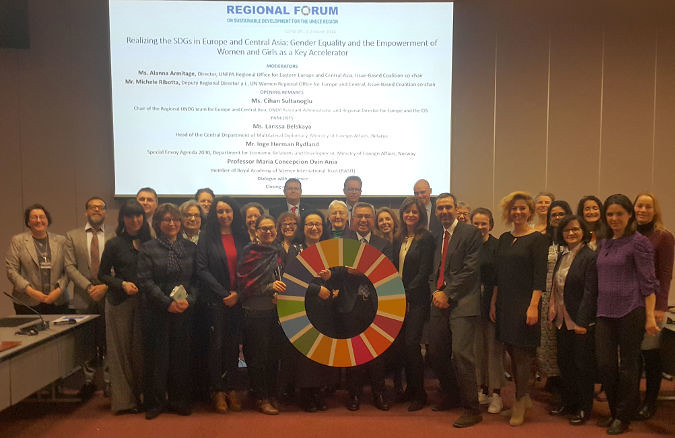
[1] All references to Kosovo on this website shall be understood to be in full compliance with UN Security Council Resolution 1244 (1999).